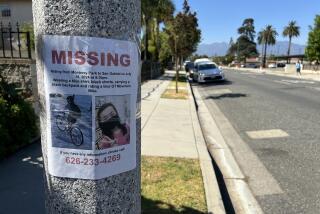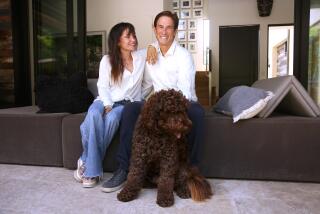The City of Angels Has Had Mayors With Demons
William Mulholland knew what it was like to lead a big bureaucracy, having overseen construction of the great aqueduct that brought water -- and development -- to Los Angeles in 1913.
So when asked what he thought of the city’s top job, Mulholland is said to have wryly replied, “Gentlemen, I would rather give birth to a porcupine backwards than be mayor of Los Angeles.”
Yet, for several of the 40 men elected mayor since the city incorporated in 1850, the difficulty of the job wasn’t what complicated their lives; they were discredited or done in by more personal failings.
Consider the little-known Bernard Cohn, who maintained two families in different parts of town. Or Charles E. Sebastian, who was shamed into resigning as a result of an adulterous affair.
As incumbent Mayor James K. Hahn prepares for the May 17 runoff against City Councilman Antonio Villaraigosa, we look back at the fortunes -- and misfortunes -- of some of those who have gone before.
*
Damien Marchessault
1859-60, 1861-65
Of French-Canadian ancestry, Marchessault was a carousing former New Orleans gambler before guiding the city during the Civil War.
He was twice elected mayor, but it was the job he held afterward, overseeing the city’s water supply, that led to his undoing, according to “Los Angeles A to Z, an Encyclopedia of the City and County,” by Leonard and Dale Pitt.
He and a partner had laid wooden water pipes -- hollowed-out logs from the San Bernardino Mountains -- that were always bursting at the joints and turning the streets into sinkholes.
With that and personal problems mounting, he could take it no more. On the morning of Jan. 20, 1868, he slipped into an empty City Council chamber and shot himself to death.
A note on the table near his body begged his wife’s forgiveness for his business debts, his drinking and gambling, and his suicide: “I am now ashamed to meet my fellow man on the street.”
*
Bernard Cohn
1878 (Nov. 21-Dec. 5)
A city councilman from 1878 to 1884, Cohn doesn’t appear on some listings of Los Angeles mayors because he served only 15 days -- by appointment after Mayor Frederick MacDougall’s death. Cohn then ran for the post but lost.
At one point, the former grocery store owner and moneylender was accused of buying votes and helping a son get city business.
He also is said to have swindled Pio Pico -- the last governor of Mexican California -- out of his ranch, according to Paul Gray, a Claremont attorney and author of “Forster vs. Pico: The Struggle for the Rancho Santa Margarita.”
Yet, Cohn was more infamous for his domestic situation. He maintained two families: one Jewish and one Catholic. At one end of town, he was a respected Jewish leader, married with three children. At the other end, he lived with his mistress and their six children, who were baptized in his name.
After his Jewish wife died in 1885, he married his mistress but had his coachman steal the marriage contract from his new wife’s drawer. When Cohn died four years later, his will left nothing for his wife and four living Catholic children. She sued, and more than 300 witnesses testified to Cohn’s two households, according to reports published in The Times.
The court ultimately found that his mistress was not legally married and could not share in Cohn’s estate. The three children by his wife inherited his wealth.
*
Charles E. Sebastian
1915-16
He came to Los Angeles around the turn of the century and worked as a ranch hand and railroad laborer before joining the Los Angeles Police Department. There he rose from patrolman to chief. After a decade in that job, Sebastian won election as the city’s highest public servant.
But Sebastian, too, drew notoriety from a series of personal scandals -- most proving false, but one undeniably true.
A few months before the election, his political enemies concocted a scheme that led to his indictment in the beating death of a disabled homeless man.
When those charges were dropped, he was arrested on a morals charge, accused of contributing to the delinquency of a minor, 16-year-old Edith Serkin, whose sister, Lillian Pratt, was his mistress. “Edith, it seemed, had sat in the lobby of the downtown Arizona Hotel while her sister met Sebastian in a room upstairs,” according to “Los Angeles A to Z.” Nonetheless, he was acquitted.
Then, on the eve of his election, someone fired two shots at Sebastian, narrowly missing him. On election day, he won -- and was promptly arrested and charged with setting up a fake assassination attempt to boost his campaign. Those charges were soon dropped.
Despite all of the turmoil, Sebastian continued seeing his longtime mistress. Barely a year in office, he quit after a newspaper revealed his adulterous affair by printing his love letters to her, in which he called his wife “the Old Haybag.”
His wife divorced him and his career declined. At one point, he worked as a gas station attendant.
After Sebastian suffered a stroke, Pratt could be seen pushing him in a wheelchair along the boardwalk in Venice, the city and county encyclopedia says.
*
Frank L. Shaw
1933-1938
This Depression-era mayor, a former grocery clerk turned city councilman and county supervisor, has long been accused of running the most corrupt administration in city history. He was said to govern by the “Shaw spoils system.”
Large industries were allegedly solicited for bribes in return for legislation to drive out competitors. His brother, Joe, is said to have sold police and fire department jobs by providing the answer sheets to civil service exams.
Shaw and his political cronies also were accused of filling their campaign chests with cash skimmed from gamblers, bootleggers and whorehouse madams.
The drumbeat of allegations led to a successful voter recall in 1938, branding Shaw as the only Los Angeles mayor to have been thrown out of office.
More to Read
Sign up for Essential California
The most important California stories and recommendations in your inbox every morning.
You may occasionally receive promotional content from the Los Angeles Times.






